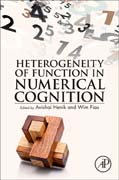
Research in the area of numerical cognition previously led to a widely accepted view that there exists a core numerical system within humans and animals alike expressed as an innate ability to perceive and count discrete quantities. The efficiency and precision of this core system increases with development and is thought to be a crucial determinant of mathematical proficiency. Though this core knowledge involves the brain's intraparietal sulcus (IPS), research findings now suggest that other cognitive domains including memory, attention, visuospatial cognition, language, and the executive functions of the brain contribute to numerical cognition and mathematical skill. These functions are essential for the proper development of numerical cognition. Heterogeneity of Function in Numerical Cognition examines these and other issues at play in the discussion of numerical cognition. With great individual differences in the development or function of numerical cognition at neuroanatomical, neuropsychological, behavioral, and interactional levels, these issues are important for the achievement of a comprehensive understanding of numerical cognition - its brain basis, development, breakdown in brain-injured individuals, and failures to master mathematical skills. A novel innovative reference on the emerging field of numerical cognition and the branches that converge on this diverse cognitive domainIncludes an overview of the multiple disciplines that comprise numerical cognition written by world-leading researchers in the fieldFocuses on factors that influence numerical cognition such as language, executive attention, memory, and spatial processingFeatures an innovative organization with each section providing a general overview, developmental research, and evidence from neurocognitive studies INDICE: Section I. Language 1. Numbers and language: What's new in the past 25 years? 2. The interplay between learning arithmetic and learning to read: Insights from developmental cognitive neuroscience 3. Language and arithmetic: The potential role of phonological processing 4. Discussion: Specific contributions of language functions to numerical cognition Section II. Performance Control and Selective Attention 5. An introduction to attention and its implications for numerical cognition 6. The control of selective attention and emerging mathematical cognition: 7. Performance control in numerical cognition: Insights from strategic variations in arithmetic during the lifespan 8. The interplay between proficiency and executive control Section III. Spatial Processing and Mental Imagery 9. How big is many? Development of spatial and numerical magnitude understanding 10. Is visuospatial reasoning related to early mathematical development? A critical review 11. Neurocognitive evidence for spatial contributions to numerical cognition 12. Which space for numbers? Section IV. Executive Functions 13. Automatic interferences and their development in the context of numerical tasks 14. The role of executive function skills in the development of children's mathematical competencies 15. Systems neuroscience of mathematical cognition and learning: basic organization and neural sources of heterogeneity in typical and atypical development 16. (How) are executive functions actually related to arithmetic abilities? Section V. Memory 17. Numerical cognition and memory(ies) 18. Hypersensitivity-to-interference in memory as a possible cause of difficulty in arithmetic facts storing 19. Working memory for serial order and numerical cognition: What kind of association? 20. Don't forget memory ... to understand mathematical cognition
- ISBN: 978-0-12-811529-9
- Editorial: Academic Press
- Encuadernacion: Rústica
- Páginas: 500
- Fecha Publicación: 01/06/2018
- Nº Volúmenes: 1
- Idioma: Inglés
